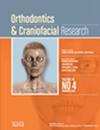Investigation of the Relationship Between ACTN3 rs1815739 Polymorphism and Openbite Cases: A Prospective Study
Abstract
Objective
The aim of this study was to examine whether ACTN3 rs1815739 polymorphism, which causes the deficiency of the alpha-actinin-3 muscle protein, is related to the formation of open bite malocclusion.
Materials and Methods
Fifty-eight participants (18.5 ± 3.6 years old) with anterior open bite (n = 29) and normal overbite (n = 29) who presented to Marmara University, Department of Orthodontics for treatment were included in the study. Initial cephalometric radiographs were used for the diagnosis of malocclusion. The case group was divided into three subgroups according to degree of open bite. For DNA isolation, oral epithelial cells were collected with buccal swabs (Van Allen Way, Carlsbad, USA), and the real-time PCR method was used for the genotyping of all polymorphisms. The results were statistically analysed, and the threshold for statistical significance was set at p < 0.05.
Results
The frequencies of RR, RX and XX genotypes of ACTN3 rs1815739 polymorphism were found as 6 (20.7%), 14 (48.3%) and 9 (31.0%) in the control group and 8 (8%), 9 (31.0%) and 12 (41.4%) in the case group, respectively. There was no statistically significant difference between the groups in terms of the presence of the examined polymorphism (p > 0.05). However, the intra-group evaluation of case group revealed a significant difference in the prevalence of XX genotype (83.3%) for the subgroup with an open bite of −5 mm or above.
Conclusion
Although no significant difference was observed between the case and control groups, a possible association was identified between ACTN3 rs1815739 polymorphism and an increased severity of open bite malocclusion.

 求助内容:
求助内容: 应助结果提醒方式:
应助结果提醒方式:


